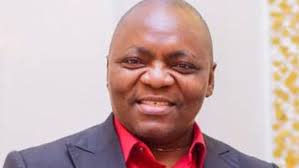
Traditional medicine not for managing unconscious patients, says NNMDA DG
Traditional medicine is better suited for preventive care and holistic treatment, according to Prof. Martins Emeje, Director General of the Nigeria Natural Medicine Development Agency. He has made it clear that traditional medicine is not for treating acute medical situations.
He clarified that although traditional medicine has many natural benefits, it is not intended to offer the quick, life-saving intervention that is required in emergency situations.
He said that hospitals, not traditional healers, should treat people in critical condition.
The goal of the agency's continuous research and development, the professor of drug delivery and nanomedicine emphasized, is to improve the speed and efficacy of conventional treatments.
However, in order to prevent putting lives in danger, the don requested that the practice's current limits be acknowledged.
"We need to make it clear that traditional medicine is preventative and holistic. When used to prevent illnesses, it works better. It is not intended to treat those who are already unconscious or to address severe crises. Every medication has advantages and disadvantages, he stated.
The head of the NNMDA clarified that traditional medicine is derived from nature and animal parts, and that it is most effective when incorporated into a regular lifestyle that prioritizes wellness and prevention over impromptu treatment.
He pointed out that a lot of people make the grave mistake of thinking that traditional treatment can take the place of emergency intervention. This is particularly dangerous when delays make it impossible to receive the right care.
Emeje agreed that allopathic or foreign treatment has the benefit of speed and accuracy in acute cases, especially because it often contains synthetic compounds that work directly and rapidly on symptoms and disease mechanisms.
“One advantage of foreign (allopathic) medicine is its rapid onset—due to its synthetic compounds, you see results quickly. Traditional medicine acts slowly because it’s made from food, herbs, and natural animal parts. It goes through digestion to be effective,” he explained.
According to him, the slow action of traditional remedies means they require time to be absorbed and reach optimal potency in the body, which makes them less ideal for emergencies such as trauma, stroke, or cardiac arrest.
Emeje pointed out that the strength of traditional medicine lies in its preventive, long-term effects on the body, including improving immunity, restoring balance, and preventing chronic illnesses when taken consistently over time.
He said Nigeria’s rich biodiversity and cultural heritage offer a strong foundation for the development of effective natural therapies, but that this must go hand-in-hand with scientific validation, standardisation, and education.
“What research and development does is refine traditional medicine to make it more potent, faster acting, and clinically effective. We don’t advise people to take a dying patient to a traditional home instead of a hospital. That’s why training and research are essential,” he said.
The NNMDA director general noted that one of the core mandates of the agency is to integrate traditional practices into the national health system through evidence-based approaches, ensuring that safety and efficacy remain the top priorities.
He stressed the importance of building trust and public confidence in traditional medicine by ensuring that practitioners are well-trained, practices are regulated, and remedies are subjected to rigorous scientific scrutiny.
The don said, “In countries where traditional medicine thrives, it’s because people are trained, standards are set, and operating procedures are developed. That’s what we also need to do. To be deliberate in training people in this field.”
Emeje also called on Nigerians to avoid placing traditional and modern medicine in opposition, but rather to explore ways both systems can complement each other, especially in non-emergency care and primary healthcare.
“What we should be doing is developing our traditional medicine, and that’s what our agency is doing, with the full support of the National Assembly,” he said.
The NNMDA DG maintained that while traditional medicine can offer support and healing in many situations, its role must be clearly understood and its limits acknowledged in the interest of public safety.
He said the agency would continue to work with stakeholders in the healthcare sector to improve traditional medicine through education, public awareness campaigns, and partnerships with academic and research institutions.
The professor of drug delivery and nanomedicine urged Nigerians to embrace the preventive power of traditional medicine while respecting the role of emergency medical services in saving lives during acute health crises.





